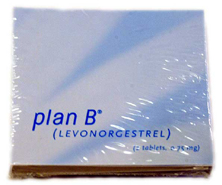The Obama administration is examining the possibility of selling the morning after pill to teenagers and the FDA has until Wednesday to respond to a request from the maker of the Plan B drug to sell it on the shelves and not behind the pharmacist’s counter.
The FDA has already taken the health and safety of women out of the hands of doctors. The FDA originally approved the morning after pill at the end of the Clinton administration in 1999 and, in 2006, it was approved for nonprescription use for women 18 and older.
 Previously, a federal court ordered the Food and Drug Administration to reconsider its decision preventing minors from purchasing the morning after pill without a prescription.
Previously, a federal court ordered the Food and Drug Administration to reconsider its decision preventing minors from purchasing the morning after pill without a prescription.
At the time, Wendy Wright, the president of Concerned Women for America, since retired, said the age restrictions need more enforcement, not less. She also worries that a parent, older sibling or other relative or older friends could purchase the morning after pill for young teens, avoiding the requirement that they visit a doctor first before using the drug.
Wright said selling the morning after pill over the counter will make it easier for men who abuse young women to cover up their crimes.
“Any adult male who is having sex with a minor could walk into a pharmacy, buy the drug, and coax the girl into taking the pill,” she said.
Wright also said that Planned Parenthood and abortion advocates were given certain restrictions by the FDA on the dangerous abortion drug RU 486, but that those haven’t been followed.
“Those restrictions have never been followed, women have died, yet no one has been punished nor the drug approval pulled,” said Wright.
But Kirsten Moore of the Reproductive Health Technologies Project, a Washington-based advocacy group, told the Washington Post that selling the morning after pill on shelves next to toothpaste and band-aids is good for women and teenagers.
“Hopefully, it will be right on the shelves between the condoms and the pregnancy tests,” she said. “We think it’s good news for women’s health and long overdue.”
Jeanne Monahan of the Family Research Council, told the Post the morning after pill can work as an abortion drug if it prevents a newly-conceived unborn child from implanting and continuing pregnancy.
“It’s not a drug that prevents life — it’s a drug that destroys life,” said Monahan. “If we define life as beginning at fertilization or conception, then this drug can be an abortifacient.”
The morning after pill has done nothing to significantly curb the number of abortions.
Research from the pro-abortion Guttmacher Institute, a former Planned Parenthood research arm, shows “54 percent of women who have abortions had used a contraceptive method *usually condom or the pill) during the month they became pregnant.” These figures are similar to those of a report in Spain showing abortions doubling despite increased family planning promotion.
And, of the women who say they did not intend to become pregnant, the report said “most of these women have practiced contraception in the past.”
Meanwhile, a report from Planned Parenthood of Western Washington shows abortions are on the rise in Washington state even though it participated in Washington state’s Take Charge pilot program.
Take Charge is a Medicaid section 1115 Waiver program initiated in 2001 to provide free contraceptives to low-income women not already covered under Medicaid. It was originally funded for five years in 2001, then extended for three more years, and comes up for renewal in 2009. Yet the PPWW annual report indicates abortions rose 16 percent from 7,790 in 2006 to 9,059 in 2007.
The failure of birth control, the morning after pill, and contraception to lower the number of abortions is no surprise to Dr. Joseph Stanford, associate professor of family and preventive medicine at the University of Utah School of Medicine.
He says studies he and fellow researchers have done show a lower effectiveness rate than the 89 percent that Plan B maker Barr Laboratories claims.
“We did more a precise meta-analysis that shows it’s effective only 72 percent of the time, and even that number is optimistic,” he indicated.
He said studies from Europe, China and the United States show that the morning after pill does not reduce abortions.







